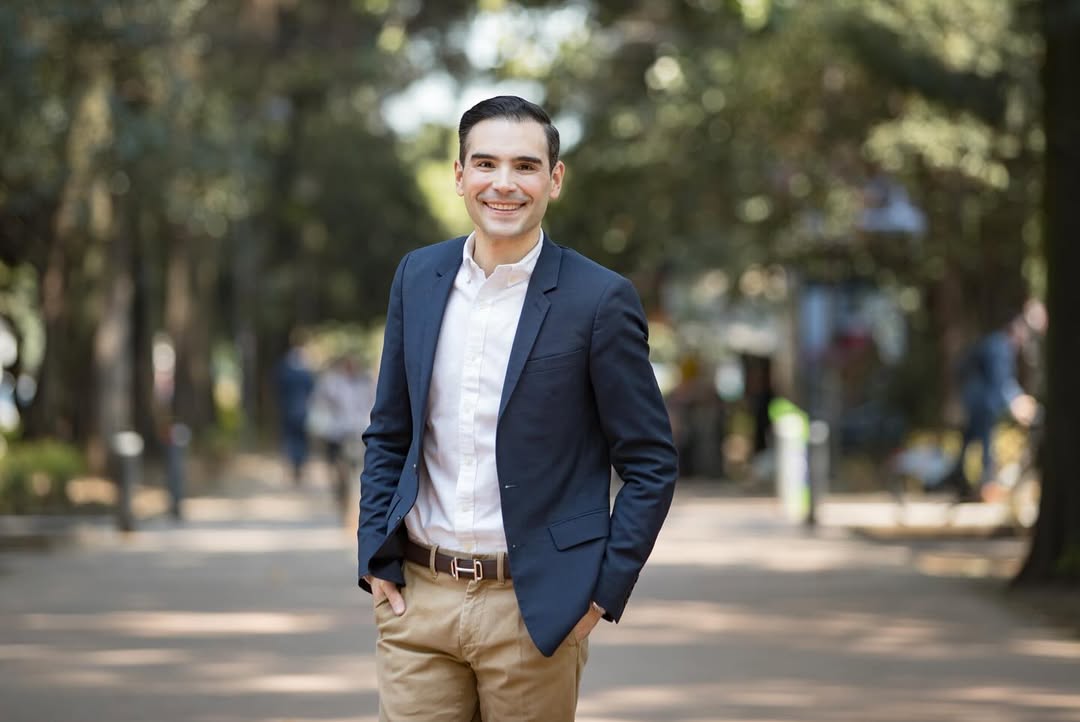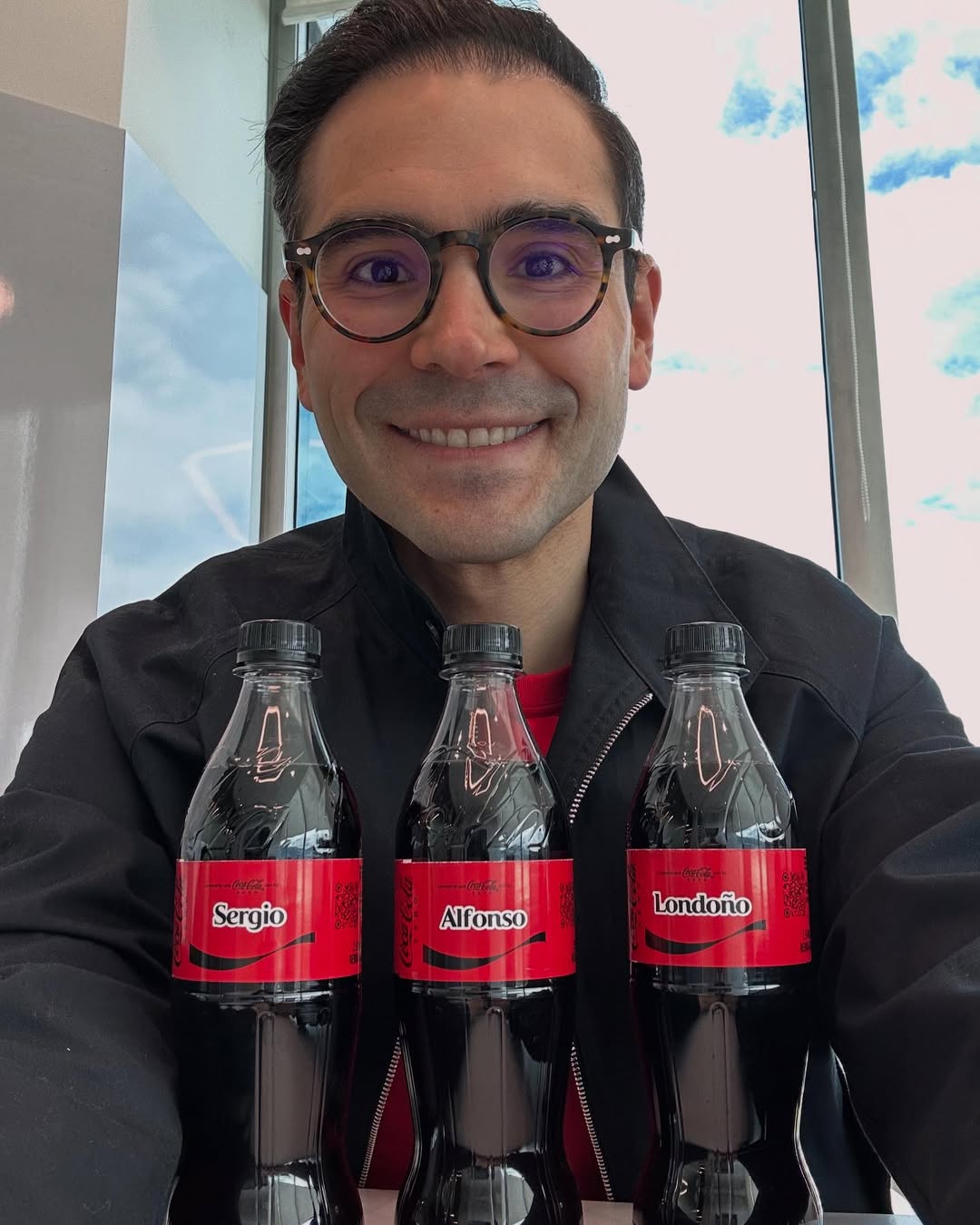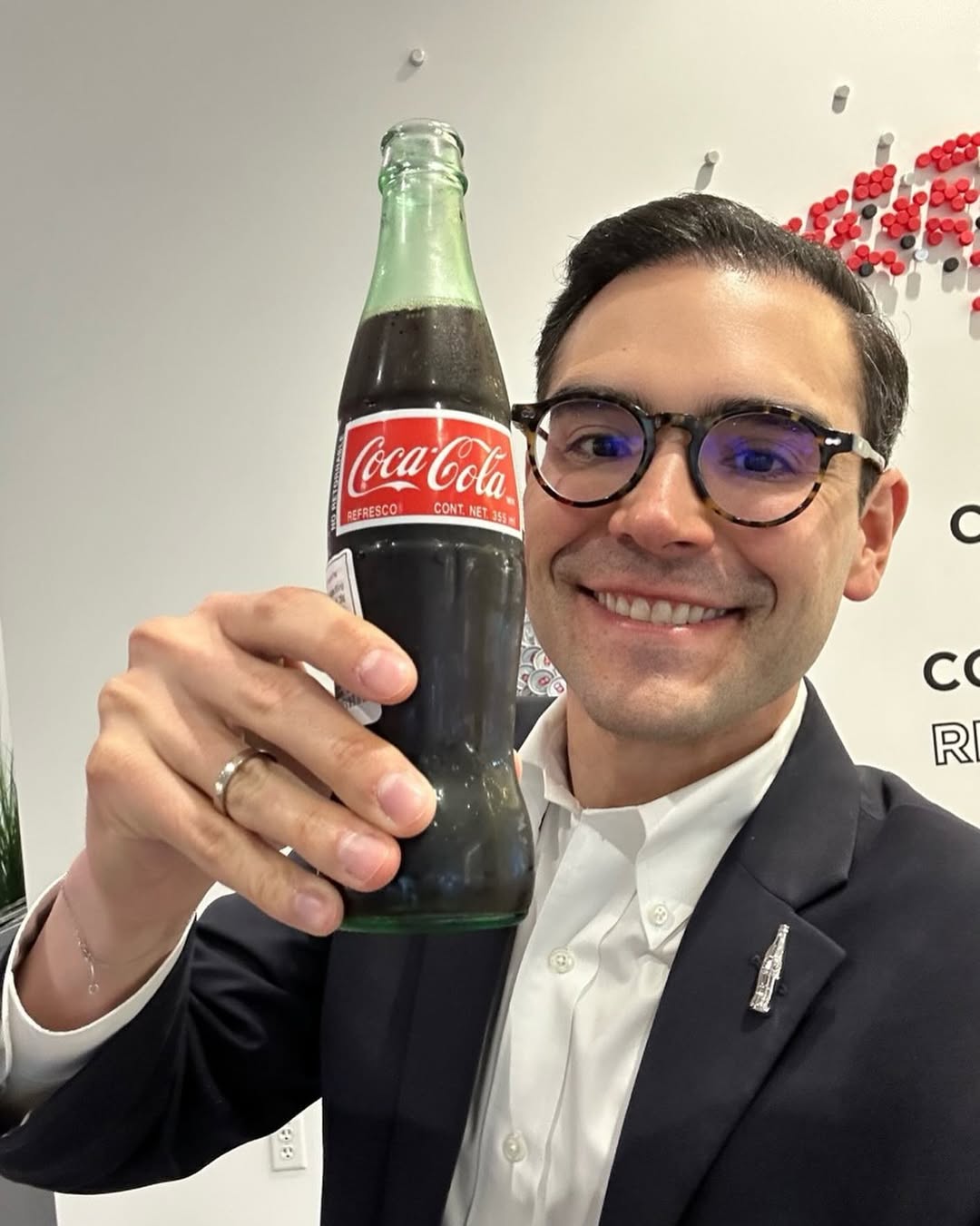40 Under 40 | Sergio Londoño: 'Leadership exercised alone doesn't go far'

He's 39 years old, a political scientist from Cartagena, and when many of us thought his calling was the public sector—because he was acting mayor of his city and director of the Presidential Agency for International Cooperation—today he holds one of the most important responsibilities in the private sector in Latin America: he's one of the youngest vice presidents of the multinational Coca-Cola.
His story is that of someone who has successfully transitioned between two worlds. His name is Sergio Londoño Zurek , and these are the keys to what he's accomplished and what he still has yet to achieve.

Sergio Londoño is one of the multinational's youngest vice presidents. Photo: Social Media
Cartagena is an essential part of who I am. That city, with all its historical weight, its diversity, its traditions, its people, shaped me. But from a very young age, I was also confronted by contrasts: wealth and poverty, privilege and deprivation. Living in a city like that forces you to open your eyes early on. I understood that I came from a privileged place and that this privilege couldn't be experienced with indifference. From school on, and through my family, we got involved in social activities, toured neighborhoods, and talked with communities. I learned that one can't stand idly by when there's so much to do. That idea has stayed with me all my life: if you have the tools, you must put them at the service of the collective well-being.
And you entered the public sector. You were an advisor to President Juan Manuel Santos. What did that experience leave you with? It was a profoundly formative period. Being in government demands that you give your all; it tests you every day. With President Santos, I learned the value of direction, of having a clear port of arrival. He often repeated a phrase adapted from Seneca: "He who knows his destination has all the winds favorable." That idea left a lasting impression on me. Knowing where you're going, having a clear purpose, allows you to make decisions more calmly, even in the midst of a storm. Furthermore, working with him taught me how to distance myself emotionally in order to lead with a cool head.
Then came bigger challenges: you became director of the Presidential Cooperation Agency. What was that period like? Intense, transformative. At APC, I took on the challenge of seeking funding for the post-conflict process, but we did so with a different vision. We didn't want to continue depending solely on official development aid, so we knocked on new doors: countries that had never donated to Colombia before, philanthropic foundations, and private-sector companies. We managed, for example, to bring in resources from the United Arab Emirates and the Howard Buffett Foundation. It was a different way of letting the world know that Colombia was ready for innovative partnerships.

Sergio Londoño is one of the multinational's youngest vice presidents. Photo: Social Media
Imagine. Cartagena went through a very tough institutional crisis. I hadn't been at APC long when they called me to take over as interim mayor. I thought it would be for two weeks, but I ended up staying for almost a year, ha ha. It was a time of great uncertainty, of great pain for the city. There was mistrust, citizen fatigue, but also a profound hope for change. Our focus was one: restoring stability and a sense of direction to Cartagena. And I tell you, it was perhaps one of the greatest and most rewarding challenges of my life.
Now that you're talking about the public sector, I want to ask you about something that's constantly on my mind: Are the most highly qualified young people moving away from public service and only wanting to work in the private sector? It's a topic that deeply concerns me. There's a kind of widespread disenchantment; an idea that the public sector is synonymous with wear and tear, attacks, and frustrations. And yes, the public sector is demanding, sometimes ungrateful, and subjects you to constant scrutiny. But it's also the space where the most important decisions for the country's direction are made. If talented, educated, and committed young people turn their backs on the state, who will lead it? I believe we must recover the value of service. Not just as an option, but as a duty. I understand that many opt for the private sector, where there is more stability and better economic conditions, but I also believe we need a generation that isn't afraid of mud, that wants to get into the fields, into institutions, to transform realities from within.
Well, you made that transition from the public to the private sector. How did you experience that change? It was a very thoughtful change. I felt I had given a lot in the public sector and needed a space to rethink myself. The pandemic hit, with all that it entailed, and I decided to take a break. I dedicated myself to my family, to studying, to reviewing my purpose. It was at that moment that I found a Coca-Cola job posting on LinkedIn. It caught my attention because it was a global company, with a local impact, and a very ambitious sustainability agenda. I started talking to my future boss, and we connected very well. I joined the company in May 2021, and since then, it's been a fascinating journey. Coca-Cola isn't just a powerful brand; it's an organization with a presence in every corner of the continent. What I learned in the public sector—listening, empathy, working with communities—has served me well in the private sector.
What are you most proud of since you joined Coca-Cola? I could mention many achievements, but there's one that particularly resonates with me. In Mexico, in a community called Santa Inés, we saw how a group of women transformed their reality through their traditional food. With support from the Coca-Cola Foundation, they set up tortilla factories, installed drinking water systems, and created a productive network that gave them economic autonomy. Seeing that, seeing how a company can be a catalyst for real development, is deeply inspiring. I'm excited to be part of a company that understands its role goes beyond selling beverages. That its purpose is to refresh the world and make a difference.
Tell me one thing, what has been your biggest personal challenge? Discipline. Having goals is important, but what truly leads you to achieve them is daily discipline. At 21, I was overweight, which was affecting my health and self-esteem. I decided to change, and I did so through perseverance. I woke up every day with a clear purpose and I fulfilled it. The same thing happened to me with public service: I don't come from a family with a political tradition or connections. But I set out to achieve it, and I achieved it, working with seriousness and focus. I deeply believe in that: in the ability to dream things, to plan for oneself, but also to walk patiently, step by step, toward that destination.

Sergio Londoño is one of the multinational's youngest vice presidents. Photo: Social Media
Many. Churchill, for example. His ability to lead amidst the storm, his strategic intelligence, his sense of duty. I'm also passionate about a key moment in American history: the transition from the Confederacy to the Constitution, with the debates between Hamilton, Madison, Adams... That was when they were defining the kind of nation they wanted to be, and they did so through dialogue, agreement, and a shared vision. I'm a history buff. I believe studying the past gives us keys to leading in the present. It helps you understand processes, anticipate scenarios, and avoid repeating mistakes.
Do you see Latin American youth as committed to today's challenges? I see a youth with enthusiasm, talent, and social sensitivity. But I also feel overwhelmed by so much information, by so many voices competing at the same time. And that can lead to confusion or paralysis. That's why I insist so much on being clear about your destination. Knowing who you are, what you want, where you're going. And also, recovering the value of dialogue. We are in an era in which shouting and incendiary tweets are rewarded. But what truly transforms is the ability to build bridges. If young people understand this, if they manage to build bridges instead of breaking them, we will have a much better society.
If a young person came up to you right now and said, “Sergio, I want to be a leader like you. I admire you. What advice would you give me?” What would you say? First, I would give him a hug, because it moves me so much to see young people with that desire. Then I would tell him: name your dream. Define a port. Believe in it with all your strength. And have the discipline to get there. But never forget that leadership in isolation is leadership that doesn't go far. Surround yourself with good people, listen, learn from others. To lead is to serve. It's about solving collective problems, not inflating personal egos. And above all: build bridges. Always.
Would you return to the public sector? Do you see yourself aspiring to any position in the future? I was taught to never say "never." Ha ha. Today I'm happy at Coca-Cola, very grateful for everything I've experienced in the private sector. But I'll always be available to contribute wherever I can be most useful. If that means returning to the public sector at some point, I'll do it gladly. What I'm clear about is that I want to continue encouraging young people to get involved, to participate, to build. From wherever they are.

Sergio Londoño is one of the multinational's youngest vice presidents. Photo: Social Media
With hope. With enormous challenges, yes. But with a youth capable of charting a new course. I deeply believe in regions. In a Colombia that thinks of itself through its territorial diversity. Bogotá is a region, the Coast is a region, the Coffee Region, the Plains, the Pacific… If we understand that diversity as a strength, if we empower the territories, this country can be much better. Centralism brought us this far. The regions can take us much further.
eltiempo





